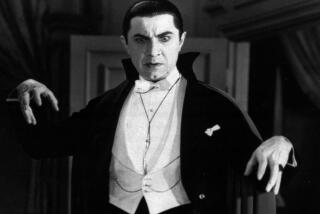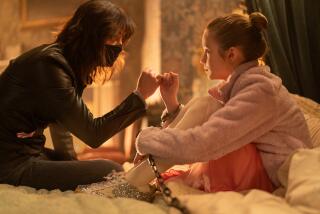Hannibal, we hardly knew ye -- and we liked that
- Share via
IN “The Philosophy of Horror,” Noel Carroll argues that monsters violate our core conceptual frameworks. By merging otherwise exclusive states of being -- zombies, for example, are both alive and dead -- they undermine our faith in a safe and orderly universe. Their threat is as much existential as physical.
Which brings us to Dr. Hannibal Lecter, a.k.a. Hannibal the Cannibal, the serial killer who parlayed his cameo in Thomas Harris’ fine 1981 thriller, “Red Dragon,” into a franchise that reaches its fourth installment in Harris’ new novel, “Hannibal Rising.”
Early on, Lecter’s power stemmed from his peripheral status. In “Dragon,” Lecter rarely appears on stage, but he dominates the novel’s imaginative space, orchestrating FBI profiler Will Graham’s investigation of the eponymous killer -- and Graham’s mutilation -- from his cell in the Baltimore State Hospital for the Criminally Insane.
In 1988’s “The Silence of the Lambs,” Lecter takes on a similar supporting role, mentoring FBI trainee Clarice Starling in her pursuit of another serial killer.
As Carroll argues, Lecter unifies contradictory categories. Capable in one breath of critiquing Clarice’s purse (“much better than your shoes”) and in another of tearing out a nurse’s tongue with his teeth (his “pulse never got over eighty-five, even when he swallowed it,” Harris informs us), he embodies civilized refinement and primitive savagery.
And his relationship with the West Virginia-born Clarice -- the patrician Lecter calls her a “hustling rube” -- lends his cannibalism a thematic weight that resonates as much in President Bush’s class-riven America as it did in President Reagan’s.
Lecter is also a genius, capable not only of holding forth on gourmet cooking but of engineering his escape two-thirds of the way through the novel -- thereby engineering as well the challenge that Harris grapples with in 1999’s “Hannibal” and again in “Hannibal Rising.”
How would he maintain the fascinating enigma of Lecter’s nature once the killer moved to center stage? This challenge undid “Hannibal.”
Lecter’s lethality reached absurd dimensions -- his revenge on Dr. Chilton, the warden of the insane asylum, is comically Grand Guignol -- while his love of the finer things played out like an episode of “Lifestyles of the Rich and Famous” featuring Jeffrey Dahmer.
The scene where Lecter eats a boxed lunch of “truffled pate de foie gras” while flying coach is a comic triumph -- but it undermines the character’s menace. We are meant not to hate -- or fear -- this Hannibal, but to empathize with him. Who likes flying coach?
Similar problems tarnish “Hannibal Rising,” which traces Hannibal’s origins from age 8, when his family is swept up in Hitler’s advance through Lithuania.
There are images of morbid beauty here -- a vine curling through a human skull, the “gloss of a handsome crow drinking from [a] rainspout” -- that echo the deft economy of the haiku beloved by Lady Murasaki, the Japanese aristocrat who adopts the orphaned Hannibal in postwar Paris.
Harris’ handling of the wartime violence is also impressive, as swift and vicious as the blitzkrieg itself. Hannibal, hiding with his family in a hunting lodge, sees his parents exterminated in the clash between a Soviet tank and a German bomber.
Soon afterward, he and his younger sister find themselves snowed in with a marauding band of looters, and as the food supply dwindles -- well, this being a Hannibal the Cannibal novel, you can guess what happens next.
Which is exactly the problem.
As the novel proceeds, Harris explains Lecter’s pathologies one by one. His aristocratic love of the finer things? Turns out Hannibal is an aristocrat, “eighth of the name” in a direct line from the 14th century Hannibal the Grim. His knowledge of anatomy? Work as an artist while in medical school. His penchant for lethal violence? The trauma of his wartime experience.
One senses Harris straining toward a theme here: Hannibal’s inhumanity reflects the inhumanity all around him. Hannibal, the book suggests, is us.
Except he isn’t, of course -- I’ve never eaten a human cheek roasted with morels, and I’m betting you haven’t either. Indeed, the Hannibal of this novel isn’t the monstrously evil being who enthralled us in “The Silence of the Lambs.”
The Hannibal of “Hannibal Rising” is a monster with morals -- as the Headmaster of his orphanage says, “It’s the bullies who get hurt.”
Like the killer in the “Saw” films, this Hannibal kills only those who have it coming. He is a vigilante, playing out his role in a typical, if unusually gruesome, revenge thriller. This Hannibal is just Charles Bronson with an overdeveloped palate -- and about as interesting.
What’s odd here is that Harris seemed to see this coming. “Nothing happened to me,” Lecter tells Clarice in “The Silence of the Lambs.”
“I happened. You can’t reduce me to a set of influences. You’ve given up good and evil for behaviorism.”
In “Hannibal Rising,” Harris has done the same.
*
Dale Bailey is the author of three novels, “Sleeping Policemen” (with Jack Slay Jr.), “House of Bones” and “The Fallen,” and a collection of short stories, “The Resurrection Man’s Legacy and Other Stories.”
More to Read
Sign up for our Book Club newsletter
Get the latest news, events and more from the Los Angeles Times Book Club, and help us get L.A. reading and talking.
You may occasionally receive promotional content from the Los Angeles Times.







